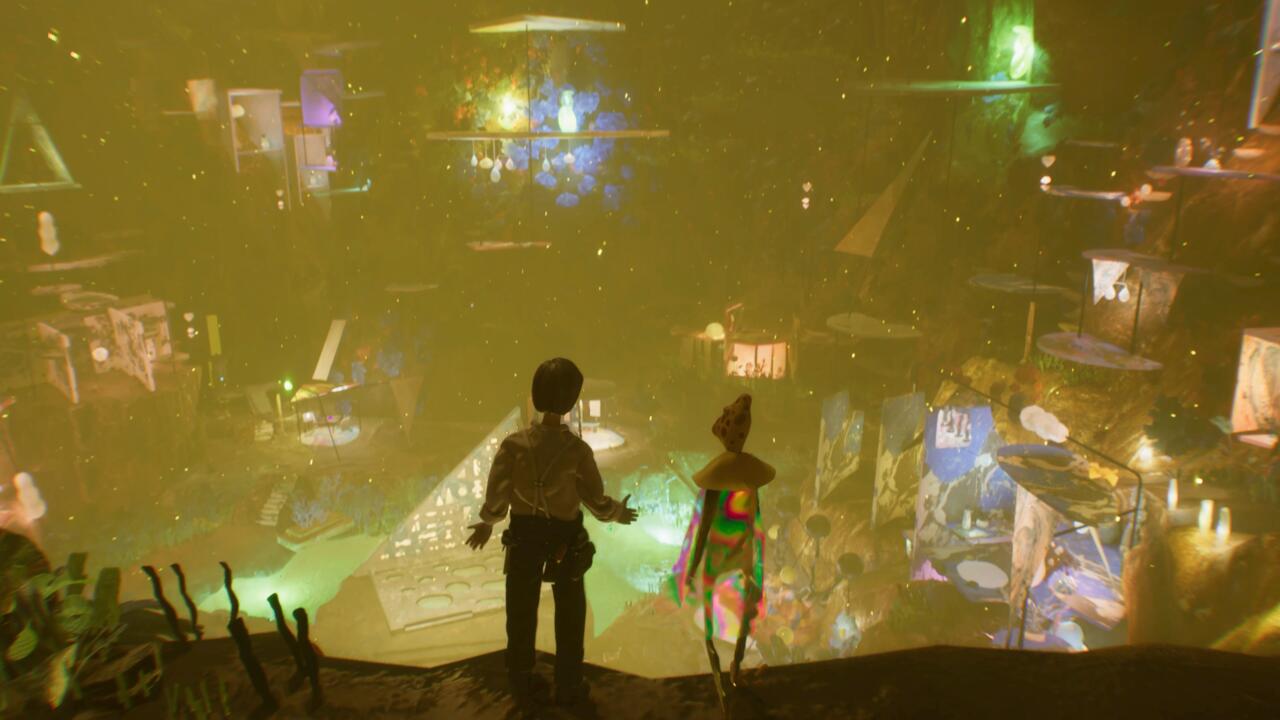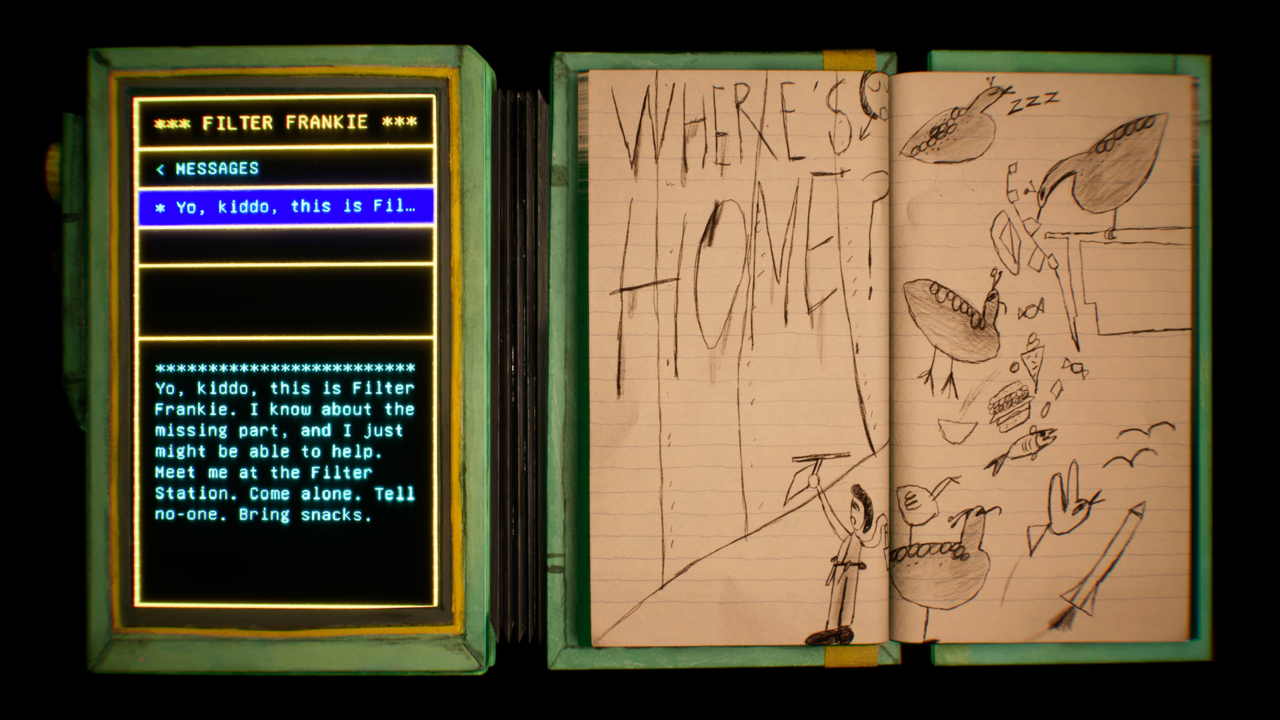Harold Halibut puts you in the shoes of a lowly maintenance worker aboard a spaceship submerged underwater. To the residents aboard the ship, Harold is a rather charming, lovable, even dopey fellow who is endearing for his simplicity and his complacency in doing his job. Harold is tasked with removing graffiti, cleaning, and fixing machines, and when the work is done, his day ends, he goes to sleep, he wakes up--rinse, repeat. That's the surface of Harold, but tucked out of sight from people's view, is a character who is deceivingly introspective, often documenting his life through scribbled images in a notepad, or expressing himself through playful theatrics when he's alone, like singing and performing operatically while mopping up a filter system. This is a side of the character only we, the player, get to see. As a character, Harold is complex, even if he doesn't entirely understand how. He attempts to question and explore his curiosity and his own existence within the confines of a spaceship he was born and raised on, but he's not always capable of understanding exactly what he's looking for.

Harold Halibut, the game, is much like its titular character: It's charming and lovable on the surface for its unique handmade aesthetic and charmingly simple gameplay. But just beneath that uncomplicated layer is a story that attempts to ask questions about introspection and self-worth, even if the game doesn't always feel equipped to answer them or understand its strongest suits.
Harold Halibut does an incredible job in exploring its many themes and concepts by putting a magnifying glass on its setting. The FEDORA is a spaceship that was designed to leave Earth during the Cold War and set forth on a 200-year journey to seek a new planet to live on, but the new world it found was devoid of any landmass. With nowhere to go, the FEDORA crashes onto the planet, plunging its occupants into the watery depths, which they've learned to colonize. Meanwhile, Harold's mentor and resident scientist, Mareaux, attempts to find a power source to launch the ship back into space to find a more suitable planet to live on.
In the meantime, as Harold, you interweave through the lives of the FEDORA's inhabitants, the ship's politics, and its inner workings. It's a monotonous process that involves checking off Harold's tasks on his PDA-like device, as you move through his day-to-day life in the quirky retro-future spaceship. But Harold's life takes an abrupt turn after discovering a humanoid fish-like being has boarded the ship, creating a whole new perspective on the planet they've, in fact, been sharing all these years. It's in this moment that Harold's seemingly monotonous life is turned on its head, inspiring curiosity in what lies beyond the only world he's ever known.

Harold Halibut is striking in its visuals because it's entirely handmade. Characters, articles of clothing, pieces of furniture, teapots, mugs, floorboards, and everything else was handmade in our real world and digitally scanned into the 3D game. Its visuals instantly distinguish Harold Halibut as one of the most visually interesting games of the year. But while it's easy to get swept up in the awe of its look, the strongest characteristic of the game is the world itself and the characters within it.
Harold Halibut is entirely focused on exploration, conversational choices, and the occasional challenge-free minigame. At its core, Harold Halibut is focused on the world and the characters that inhabit it, which, story aside, is where the game is at its best. While you may play as Harold, it's the characters you interact with who give the game a sense of intimacy and, over time, a feeling of density that shows there's actually a lot going on--these are the game's biggest achievement.
Across my 18 hours, I met nearly two dozen characters, each with their own story to unpack, and I loved all of them. More than the discovery of an alien species, or the urgency to find a power source for the ship, my biggest motivation was to get to know each and every person aboard the FEDORA. Whether it was the comical musings of the sports store owner Slippie, or the by-the-book Major who enforces the ship's laws, each character is multifaceted, with deep personalities to learn, explore, and oftentimes see challenged.
While most of the time spent with these characters is completely optional, the game's most important and consequential moments, both hilarious and heart-wrenching, start and end with the citizens of FEDORA. The conversations can feel inconsequential in the grand scheme of the game's plot, but are invaluable to making this handmade world feel alive and lived in.
With the abundance of characters also comes a desperate need to keep track of them. Early in my time with the game, before I had become well acquainted with the cast of characters, I was often confused with who was who and where they were located. The game's lack of waypoints was to its benefit, however, as this kept me engaged in using the ship's signs to navigate its many sectors, but also better learn and remember these characters, as I would with people in real life. However, those early stages also created unnecessary friction by causing me to bumble around and waste time. This could have been alleviated with the addition of an in-game glossary to remind me who is who that could have existed in Harold's PDA.

Each character is as distinct in their looks as they are their views on life--even with the shared perspective of living in the confines of a small colony underwater. It's their stories that gives the FEDORA believability and lends the game a prevailing heart and soul that overshadows all of the game's other plotlines. But its achievement of creating a rich cast of characters also gives rise to struggles in properly exploring them under the weight of its other story ambitions.
Aside from the thoughts and feelings of its very broad cast of characters is an abundance of ideas and narratives driving the main plot. These range from unpacking a corporation's ulterior motives, to a secret society lurking in the shadows, to the urgency to locate a power source for the FEDORA. And while they are no doubt necessary to tell an overarching story, they feel like ideas that are too big for the dollhouse-sized nature of Harold Halibut.
As Harold's world aboard a spaceship begins to collide with the alien world he's been living on, he makes friends with the planet's inhabitants, which are known as the Flumuylum. The fish-like humanoids' philosophies are a complete contrast to that of humans, though also pretty much what you'd imagine what it would be like if fish were humans: a species that simply floats along through life, existing and observing, giving little to no meaning to anything. This mentality crashes head-on with Harold's everyday existence: a life that boils down to routinely taking orders and doing what other people expect of him, often in service of the ship's corporation-based ethos and in adherence to arbitrary rules like having a curfew or paying for its water tube transportation system. The duality between Harold's and the Flumuylum's lives are juxtaposed for several hours in the game, until Harold is forced into a crash course in existentialism towards the latter half of the game, causing him to question whether or not he was ever in control of his own life. The scene was a tonal whiplash as the game made a hard turn to answer questions that it had only just begun to ask, and in doing so, felt more clunky than enlightening.
Harold's abrupt journey of introspection is sandwiched on top of and between the stories and ideologies of other characters, as well as the game's overarching plots and conspiracies. No one idea or theme felt like it had the breathing room it needed or deserved, which means they can feel more like fleeting concerns instead of food for thought. For example, one scene hints at themes of the industrialization, pollution, and consumption of animal products by the human race, only to never refer to it again, or even set up a satisfying throughline for its purpose in the first place.
In trying to weave its characters, story, and themes together, I found its focus to become muddled. With such an emphasis on all its characters, and by making them an integral part of the game's core experience, Harold ends up being the only character that has a substantial narrative arc--he sees his world through the lens of a mere errand boy but has his world turned upside down, creating a perspective that gives his life more meaning by the end. But in spending the time to do this, the game, in turn, leaves many threads for the other characters I had grown attached to feeling unfulfilled. By the time the climatic end unfolds, I was less interested in the conspiracies behind the events that transpired and more focused on the growth of the characters.
Harold Halibut is at its strongest when intimately exploring its characters, their inner workings, and their relationships with one another. But in attempting to build towards a dramatic conclusion, many of the hours spent fostering relationships with the characters took a backseat to plotlines that were less interesting.
To quote one of the game's own characters, Buddy the mailman, "each person aboard this ship is a world their own." In a story about a man trapped on a ship, who is trying to understand himself better, their lives and perspectives should be the most important stories to tell for Harold's journey. Harold Halibut's world and the people that inhabit it were literally crafted by people that cared about him and his story. And while that story struggles under the weight of its ambitions, the human touches on every part of it are evident. Those are the heart and soul of the game, and they imprinted on me too.